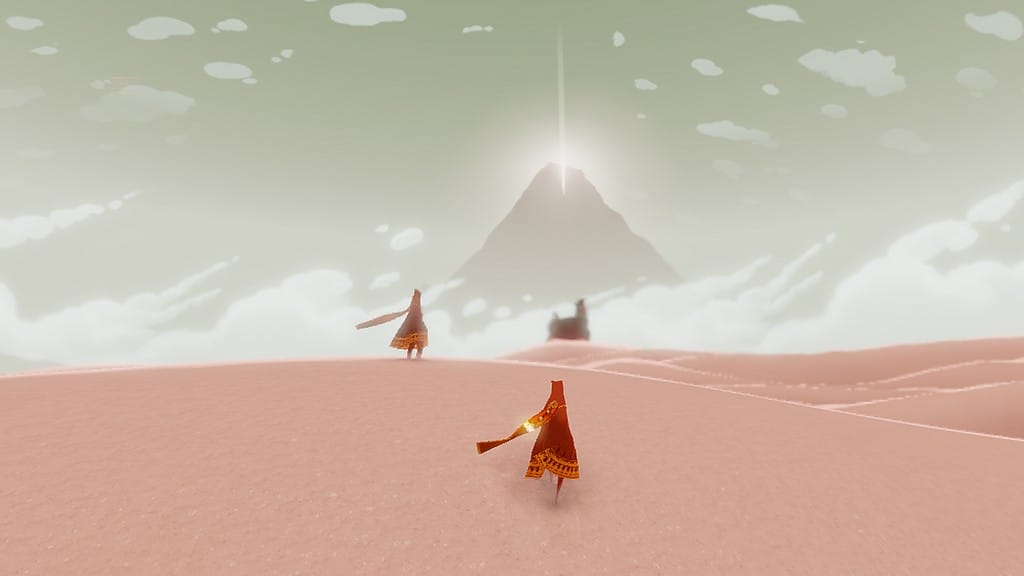Journey’s greatest gift to videogames was telling us all to shut up

There are cottage-land rituals I was never aware of. I just thought it was quaint the way passing small boat captains would wave at me like children from a school bus, until I learned that neglecting to return the favour was poor sport. “You just have to,” said my brother, “it’s rude not to wave.”
Much later, out on the dock, I engaged in a much more interesting exchange. It was dark, we were smoking, and I was dicking around with the flashlight. I pressed the button lightly enough to strobe it, and beamed my light across the lake incoherently, when suddenly, I saw a blink in the darkness. I paused, wondered if it was some moonlight reflection, so I began making patterns. One, one-two, one. The light blinked similarly. One-two, one, one-two. We began a conversation. We patterned. We waltzed. This dumb routine was fun. We didn’t know Morse code, but we worked with what we had: a lake, the night, plastic, light bulbs and some AAs. It’s amazing how you can connect despite technological limitations.
I had no way to say hello
When Journey came out in 2012, it was never the visuals that lingered with me. I certainly appreciated the scale, the calm, the sifting sands, the hero’s ouroboros and the Jodorowskian visual sensibilities. I could respect the way that resonated with others, but for me that part of the package felt more new-to-games than new-to-me. I, like so many others, didn’t know there would be a multiplayer component, and how it functioned was the pleasant surprise that elevated Journey to a much more profound experience.
It wasn’t until the third area that I spotted another player. Like something out of the corner of my eye, gliding between the ruins and absorbed into the sand’s illusions. When I finally confronted one, seeing it from afar and bolting towards it, I had a revelation. I had no way to say hello.

There is one button—a chime—which, if you hold it down, the noise, glow and matching-glyph becomes stronger. You do not have access to speak through your microphone, which was a defiant stylistic choice at the time, even if it was never as popular a piece of hardware on the PlayStation 3 as it was on the Xbox. You could not even get a peek at your guest’s username—it’d only be revealed during the credits like an understudy or a stage hand. I’m sure some first encounters might make players think these companions were computer controlled, but anyone who had really gotten an adventure out of Journey would tell you, proudly, otherwise.
I hit the jackpot. Me and my anonymous partner stuck it through from our meeting to the end. We wandered the desert, braved the vicious monsters, and froze to a near death. If one was injured, we’d nudge each other like dolphins to get spirits back up. But the chime, that strange chime, our only way to speak—that we could use.
A simple, deep one worked in place of a flare, to locate ourselves if we lost sight. If we spotted a thing of interest, some collectable or health perk, we’d rattle the chime like someone pounding an elevator button when they have to pee. There were small cautious notes when danger was near. Even as we weakened on the snowy peaks, we’d yip out to make sure the other hadn’t gone into a total coma. In this short time, we found a way.
Language is more than just words and meanings
People have an uncanny knack for communicating. It’s an instinct. Language is more than just words and meanings, but patterns and tones. Language can be circumstantial. If you’re travelling, you’ll rely on hand gestures. If you can’t read, you’ll look for symbols, reoccurrences to navigate. You translate your circumstances.
When you cannot depend on the full complicated web of your native tongue, you reduce, you deconstruct it into basics, something you can use. It’s why music can be made out of nonsense within Plink. It’s why, even with merely one noise, one light, one icon, you’re able to cooperate and communicate in Journey.
At the cottage, I didn’t have these tools. I’d lost cellular reception. I was highways away from cities and friends. I was surprised I had wifi, honestly. But I could still make a memory with a stranger whose face I’ll never see. Journey puts a lot on mute. It’s a siesta from the noise and trash talk and howling typically associated with online multiplayer. It’s a vacation from things, from the clutter, back to basics. And even with those basics, you’re capable of extraordinary things.



